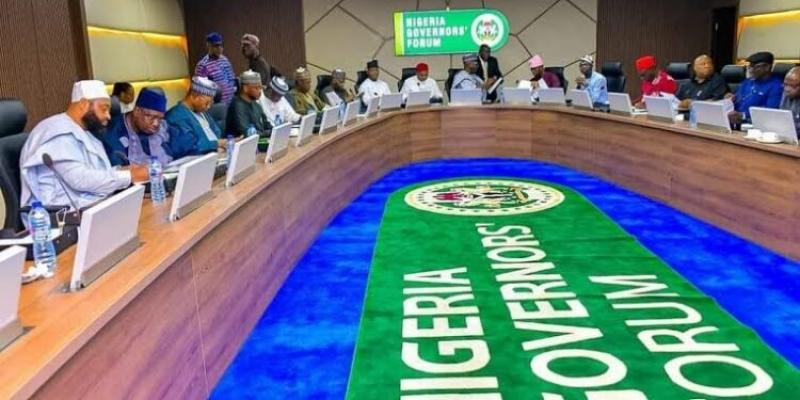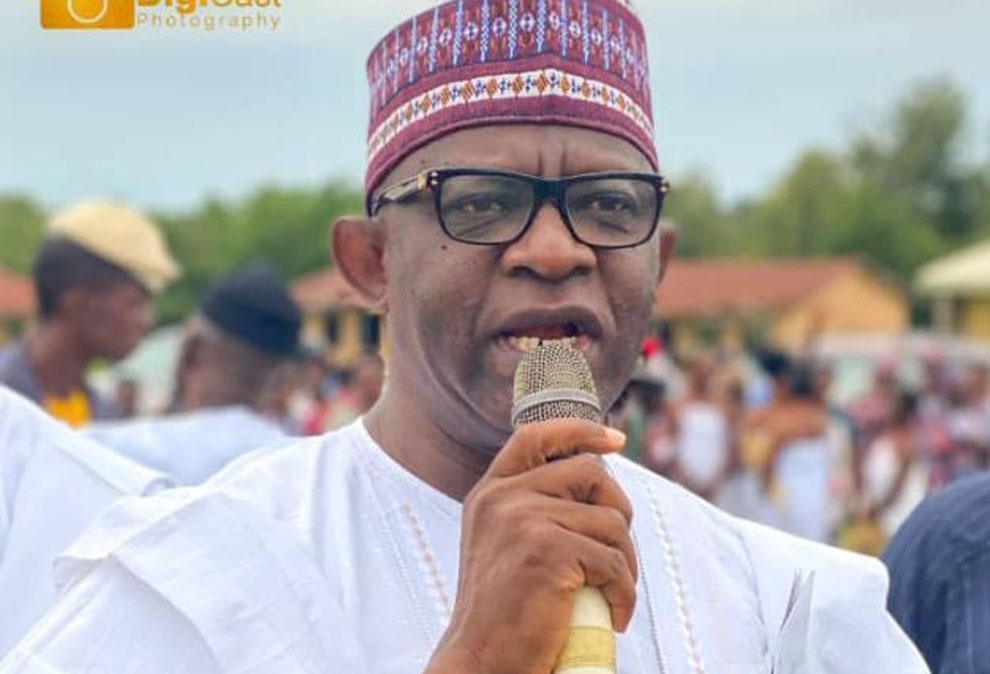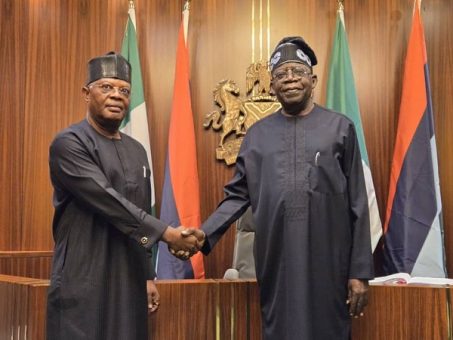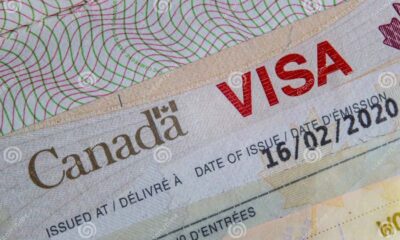News
Buhari signs bill compelling new President to submit ministers list within 60 days

President Muhammadu Buhari on Friday signed a bill compelling president-elect and governors-elect to submit a list of ministers or commissioners nominated to the national and state assemblies within 60 days of being in office.
The law will take effect from the time President-elect, Asiwaju Bola Tinubu, takes oath of office on May 29, 2023.
This is one of the bills the President assented to on Friday.
Other bills signed into law include financial independence for state houses of assemblies and state Judiciary.
There are also bills that seek to remove railway, prison, and electricity from the exclusive legislative list to the concurrent list.
In January, it was reported that 35 constitutional amendment bills were passed and transmitted to Buhari for assent.
READ ALSO:
- ICC judges issue arrest warrant for Putin over war crimes in Ukraine
- NJC indicts Taraba Chief Judge, recommends immediate retirement
- MC Oluomo bows to pressure, withdraws anti-Igbo threat
A total number of 44 bills were transmitted to the state house of assemblies by the national assembly but only 35 were approved by 24 states.
Financial and legislative autonomy for local governments were among the bills not approved by the states.
Sections 9(2) and (3) of the 1999 constitution require two-thirds of all the state assemblies — 24 states — to approve constitutional amendment bills.
Wase said four of the constitutional amendment bills signed into law by Buhari deal with “devolution of powers/promoting true federalism and also strengthening of state houses of assembly and judiciary”.
He commended the president and members of the national assembly for “working tirelessly to ensure the passage of this legacy legislations”.
Below are the bills signed into law.
1. Fifth Alteration (No.1), the Bill seeks to alter the Constitution of the Federal Republic of Nigeria, 1999 to change the names of Afikpo North and Afikpo South Local Government Areas; and for related matters.
2. Fifth Alteration (No.2), the Bill seeks to alter the Constitution of the Federal Republic of Nigeria, 1999 to change the name of Kunchi Local Government Area; and for related matters.
3. Fifth Alteration (No.3), the Bill seeks to alter the Constitution of the Federal Republic of Nigeria, 1999 to change the names of Egbado North and Egbado South Local Government Areas; and for related matters.
4. Fifth Alteration (No.4), the Bill seeks to alter the Constitution of the Federal Republic of Nigeria, 1999 to correct the name of Atigbo Local Government Area; and for related matters.
5. Fifth Alteration (No.5), the Bill seeks to alter the Constitution of the Federal Republic of Nigeria, 1999 to correct the name of Obia/Akpor Local Government Area; and for related matters.
6. Fifth Alteration (No.6), the Bill seeks to alter the Constitution of the Federal Republic of Nigeria, 1999 to provide for the financial independence of State Houses of Assembly and State Judiciary; and for related matters.
READ ALSO:
- BREAKING: Fresh permutation as PDP, LP merge to unseat Dapo Abiodun ahead of Saturday
- Abductors of Lagos trader demand ransom in dollars
- 27 top politicians plotting to scuttle Rivers gov poll – Wike
7. Fifth Alteration (No.8), the Bill seeks to alter the Constitution of the Federal Republic of Nigeria, 1999 to regulate the first session and inauguration of members-elect of the National and State Houses of Assembly; and for related matters.
8. Fifth Alteration (No.9), the Bill seeks to alter the Constitution of the Federal Republic of Nigeria, 1999 to delete the reference to the provisions of the Criminal Code, Penal Code, Criminal Procedure Act, Criminal Procedure Code or Evidence Act; and for related matters.
9. Fifth Alteration (No.10), the Bill seeks to alter the Constitution of the Federal Republic of Nigeria, 1999 to exclude the period of intervening events in the computation of time for determining pre-election petitions, election petitions and appeals; and for related matters.
10. Fifth Alteration (No.12), the Bill seeks to alter the Constitution of the Federal Republic of Nigeria, 1999 to provide for the post-call qualification of the Secretary of the National Judicial Council; and for related matters.
11. Fifth Alteration (No.15), the Bill seeks to alter the Constitution of the Federal Republic of Nigeria, 1999 to delete the item “prisons” in the Exclusive Legislative List and redesignate it as “Correctional Services” in the Concurrent Legislative List; and for related matters.
12. Fifth Alteration (No.16), the Bill seeks to alter the Constitution of the Federal Republic of Nigeria, 1999 to move the item “railways” from the Exclusive Legislative List to the Concurrent Legislative List; and for related matters.
13. Fifth Alteration (No.17), the Bill seeks to alter the Constitution of the Federal Republic of Nigeria, 1999 to allow States to generate, transmit and distribute electricity in areas covered by the national grid; and for related matters.
14. In Fifth Alteration (No.23), the Bill seeks to alter the Constitution of the Federal Republic of Nigeria, 1999 to require the President and Governors to submit the names of persons nominated as Ministers or Commissioners within sixty days of taking the oath of office for confirmation by the Senate or State House of Assembly; and for related matters.
15. In Fifth Alteration (No.32), the Bill seeks to alter the Constitution of the Federal Republic of Nigeria, 1999 to correct the error in the definition of the boundary of the Federal Capital Territory, Abuja; and for related matters.
16. In Fifth Alteration (No.34), the Bill seeks to alter the Constitution of the Federal Republic of Nigeria, 1999 to require the Government to direct its policy towards ensuring the right to food and food security in Nigeria; and for related matters.
News
Why governors’ forum is silent on Rivers emergency, by DG

Why governors’ forum is silent on Rivers emergency, by DG
The Nigeria Governors’ Forum (NGF) yesterday attributed its neutral position on the recent declaration of a state of emergency in Rivers State to the need to steer clear of taking positions that may alienate members with varying political interests.
Taking positions on contentious partisan issues, the NGF said, would not augur well for it, especially in view of its past experience in fundamental division.
Notwithstanding, the declaration of the state of emergency by President Bola Tinubu yesterday generated more kudos and knocks from across the country.
Special Adviser to the President on Senate Matters, Senator Basheer Lado, said the action of the president was meant to ensure protection of lives and restoration of law and order in the state, while the President’s Special Adviser on Media and Public Communications, Sunday Dare, said his principal was required to “avert needless harm and destruction .”
National Publicity Secretary of the ruling All Progressives Congress (APC), Felix Morka, said Tinubu, by his action, cleared what had manifested as a constitutional crisis in Rivers state.
But former President Goodluck Jonathan saw it from a different perspective.
READ ALSO:
- Senate didn’t get 2\3 majority for Tinubu emergency rule in Rivers –Tambuwal
- FG destroys another 200 containers of expired drugs
- Rivers court bars woman from answering ex-husband’s name
He described “abuse of office and power by the three arms of government in the country“ as a dent on Nigeria’s image.
The NGF, in a statement by its Director General Abdulateef Shittu, said it is essentially “an umbrella body for sub-national governments to promote unified policy positions and collaborate with relevant stakeholders in pursuit of sustainable socio-economic growth and the well-being of the people.”
It added: “As a technical and policy hub comprising governors elected on different platforms, the body elects to steer clear of taking positions that may alienate members with varying political interests.
“In whatever language it is written, taking positions on contentious partisan issues would mean a poor sense of history — just a few years after the forum survived a fundamental division following political differences among its members.
“Regardless, the Forum is reputed for its bold positions on governance and general policy matters of profound consequences, such as wages, taxes, education and universal healthcare, among others.”
It asked for “the understanding of the public and the media, confident that appropriate platforms and crisis management mechanisms would take care of any such issues.”
Why governors’ forum is silent on Rivers emergency, by DG
News
Rivers: Tinubu acted to save state, economy, says Karimi

Rivers: Tinubu acted to save state, economy, says Karimi
Chairman of the Senate Services Sunday Karimi has hailed President Bola Tinubu for the decision to declare a state of emergency in Rivers State.
He told reporters on Friday in Abuja that the President acted in the best interest of the State and Nigeria, having taken his decision in compliance with the Constitution.
“No President or government worth a name, will fold its arms and watch a political situation deteriorate to what we saw unfolding in Rivers State.
“We saw that bombing of pipelines had begun, and the security situation was getting worse with the tension everywhere”, Karimi stated.
Karimi, who represents Kogi-West on the ticket of the All Progressives Congress (APC), recalled the “fatherly role” Tinubu had played in the crisis since 2023 in a bid to get the Minister of the Federal Capital Territory (FCT), Nyesom Wike, and suspended Governor Siminalayi Fubara to reach an understanding, to no avail.
He explained: “We were all here in 2023 when Mr President called that truce meeting at the Aso Rock Villa. There was the eight-point agenda for settlement reached between the factions.
“When Nigerians expected that progress should be made to achieve peace, things started deteriorating considerably to a point where the governor demolished the House of Assembly building and administered the state with only three legislators.”
READ ALSO:
- Oluwo accuses Ooni of plotting to dethrone him
- Natasha: Court blocks recall attempt, stops INEC
- US ends legal status for 500,000 immigrants
Karimi observed that with the recent judgment of the Supreme Court, which gave the upper hand to the 27 lawmakers loyal to the camp of the FCT Minister, matters merely got worse in the State as the lawmakers were set to impeach the Governor.
“What did you expect would be the implications? There would have been more destruction, killings and economic losses for the country.
“With the bombings that had already started, it was a matter of time before the whole state would be engulfed in flames. No responsible President would sit, arms folded, and allow that to happen “ he added.
The senator further argued that it took “painstaking efforts” by the administration to raise daily crude oil production to around 1,800 barrels, noting that Nigeria’s economy was already “witnessing a rebound under the renewed hope projects of the government.”
“Allowing the situation in Rivers to get worse before he would act, wouldn’t have helped the state or Nigeria as a country in any way.
“Mr. President intervened at the right time, and his actions are covered by law,” he said.
Karimi also spoke on the emergency declaration in Borno, Yobe, Adamawa and a couple of other states by former President Goodluck Jonathan without removing the Governors from office or suspending the state assemblies.
According to him, the case with those States was not generated by political crises but rather security concerns.
“So, I will advise those comparing the two scenarios to remember that one was purely about security threats resulting from the insurgency caused by Boko Haram, while that of Rivers is clearly political.
“It was the proper thing to do to suspend the political actors in the two factions to allow for tensions to diffuse. Nigerians should appreciate the President for the action he has taken so far,” he stated.
Sen. Karimi also noted that there was no cause for alarm as the National Assembly had indicated that the emergency rule could be reviewed as soon as there were signs that things could quickly normalise in Rivers State.
Rivers: Tinubu acted to save state, economy, says Karimi
News
Just in: Tinubu swears in Rivers Sole Administrator Ibas

Just in: Tinubu swears in Rivers Sole Administrator Ibok-ete Ibas
President Bola Tinubu has sworn in Vice Vice Admiral Ibok-ete Ibas (Retd.) as the Sole Administrator of Rivers State.
The administrator was sworn in on Wednesday after a short meeting with the President.
Tinubu announced the appointment of the retired naval chief at a nationwide broadcast on Tuesday, when he declared a state of emergency in Rivers State and suspended Governor Siminalayi Fubara, Deputy Governor, Ngozi Odu, and the state House of Assembly members.
The President said his decision was based on Section 305 of the 1999 Constitution, saying he could not continue to watch the political situation in Rivers escalate without taking concrete action.
The suspension of Fubara and other elected representatives has been rejected and condemned by many eminent Nigerians, legal luminaries, groups such as Atiku Abubakar, Peter Obi, Femi Falana, the Labour Party (LP), the Peoples Democratic Party (PDP) and the Nigerian Bar Association.
However, the emergency rule has been praised by the pro-Nyesom Wike Assembly led by Martins Amaewhule, accusing Fubara of contravening the Supreme Court ruling on the political situation in the state.
Ibas was the Chief of Naval Staff from 2015 to 2021.
He is from Cross River State where he had his early education.
The new sole administrator went to the Nigerian Defence Academy in 1979 from where he proceeded to have a successful career in the Navy, rising through the ranks to the very top.
He is a member of the Nigerian Institute of International Affairs (NIIA) and the Nigerian Institute of Management.
President Muhammadu Buhari who appointed him as Chief of Naval Staff conferred him with the National Honour of Commander of the Federal Republic (CFR) in 2022.
-

 metro1 day ago
metro1 day agoRivers administrator Ibas fires Fubara’s political appointees
-

 metro1 day ago
metro1 day agoJUST-IN: Ex-Oyo gov Ajimobi’s first child Bisola dies At 42
-

 International3 days ago
International3 days agoCanada removes bonus ranking points for job offers in Express Entry system
-

 metro2 days ago
metro2 days agoHow ritualists, native doctor drugged, murdered underage sisters in PH – Police
-

 metro1 day ago
metro1 day agoFG declares public holidays for Eid-el-Fitr
-

 Sports3 days ago
Sports3 days agoNigeria’s Super Eagles falter in W’Cup qualifiers against Zimbabwe, S’Africa lead, Egypt, Morocco qualify
-

 metro3 days ago
metro3 days agoAkpabio has habit of abusing women, says Atiku
-

 Africa2 days ago
Africa2 days agoNiger coup leader sworn in as president for five years











